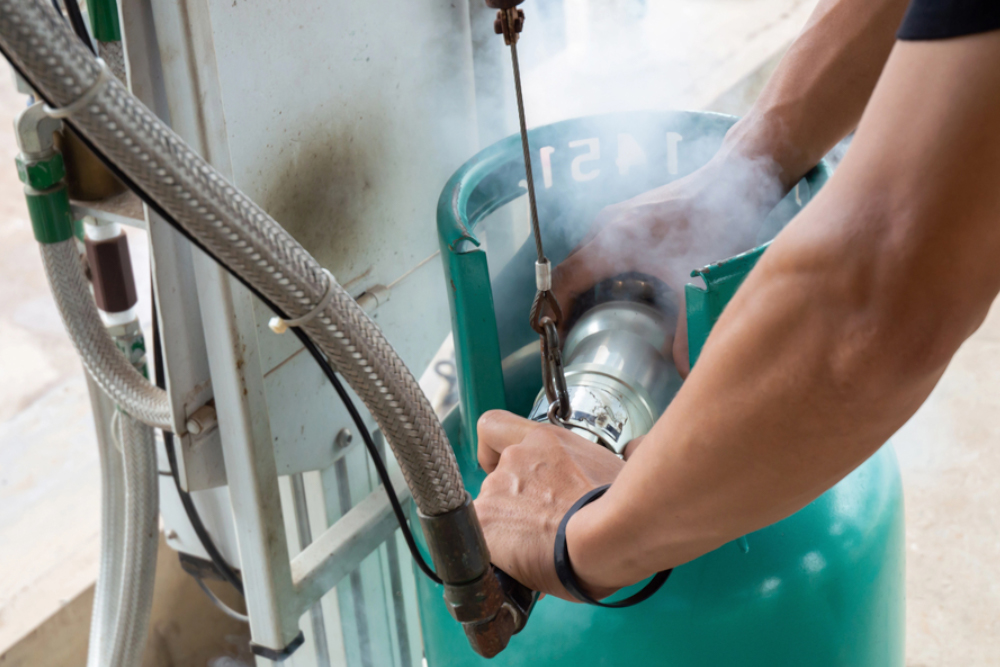How To Check For Propane Tank Leaks
Propane is a dependable energy source for heating, cooking, and running appliances in homes and businesses. Safety remains critical, particularly when it comes to leaks. An undetected leak can expose people to health hazards and create serious fire risks.
Learning how to check for propane leaks gives you the knowledge to stay ahead of potential issues and maintain a dependable fuel system. Consistent checks and proper precautions play a vital role in protecting both property and the people who live or work in it.
Why Propane Leaks Happen
Leaks may occur for several reasons. Loose connections between the cylinder valve and the regulator are a common source. Seals can weaken over time, and fittings may shift out of place. Hoses or valves that become damaged can also allow gas to escape.
Rust within a tank may compromise its structure and interfere with odor detection. Seasonal temperature changes that expand and contract metal components can create small openings at fittings. Recognizing these risks allows you to act before problems escalate.
Common Signs of a Propane Leak
Smell is the most recognizable indicator. An odorant resembling rotten eggs or skunk spray is added by manufacturers so that leaks are easy to detect. However, smell is not the only warning. Appliances powered by propane may produce weaker flames or fail to ignite altogether.
A sudden increase in fuel usage without added demand may also signal a leak. For households with monitoring systems, telemetry alerts can indicate a faster-than-expected drop in supply. Each of these signs warrants immediate attention.
The Bubble Test: A Simple At-Home Method
One effective way to check for leaks is the bubble test. This test uses either leak detection fluid or soapy water.
- First, turn the tank service valve fully to the right until it is in the off position.
- Apply the solution to the connection points between the valve and the regulator.
- Slowly turn the valve back to open.
- If bubbles form, a leak is present. Tighten the fittings and repeat the test. If bubbles continue, stop using the tank and call a qualified technician.
This method is straightforward, safe, and helps confirm concerns when other signs are not clear.
Safety Steps if a Leak is Suspected
Immediate action is required when a leak is detected or strongly suspected. Turn off the tank valve if it can be done safely. Extinguish any open flames, including pilot lights, candles, and cigarettes. Refrain from using electrical switches, phones, or appliances that may produce sparks.
Evacuate the area promptly and contact your propane supplier from a safe location. Do not re-enter the property until professionals have cleared the space. Acting quickly reduces fire risks and safeguards those around you.
Preventive Practices for Propane Safety
Routine checks lower the chance of encountering a leak. Inspect connections and hoses before the first use of the season or after extended storage. Replace worn or damaged parts promptly. Keep tanks outdoors in a well-ventilated space, away from direct heat.
For added peace of mind, schedule inspections with qualified technicians. They can test the system, adjust connections, and make necessary replacements. Staying proactive supports safety and promotes longer equipment life.
For more detailed guidance, you can learn more about propane safety.
When to Seek Professional Help
Certain situations require professional expertise. If bubbling persists during a leak test even after tightening connections, contact a technician immediately. If the tank valve is damaged or difficult to close, avoid attempts at repair.
Large leaks in enclosed spaces should be treated as emergencies and handled by trained teams equipped with the right tools. Their knowledge reduces risks to both property and people. In such moments, having a dependable service partner makes a critical difference.
Connecting Propane Use to Daily Comfort
Propane is versatile. It fuels heating systems, stoves, water heaters, and even generators. But its convenience relies on safe handling. Learning how to check for propane leaks forms part of responsible use.
Regular checks, attention to signs, and professional inspections keep the system dependable. By weaving these steps into household routines, propane continues to deliver comfort without interruption or concern.
For homes and businesses in Pennsylvania and Maryland, reliable propane access means safety and performance go hand in hand.
Take Action with Aero Energy
At Aero Energy, we take safety as seriously as supply. From leak checks to scheduled deliveries, our team supports households and businesses that rely on propane. If you suspect a leak, need an inspection, or want guidance on safe propane use, we are ready to help.
Call us, schedule an appointment, or connect through live chat today. Let us help keep your system safe and your fuel supply steady.
